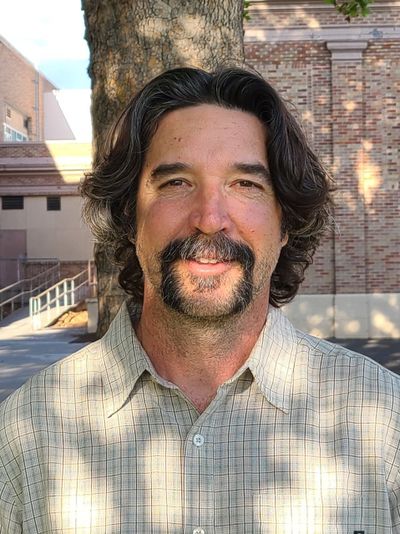Stop signs and wild spaces: Yurt-maker Patrick McKann joins Spokane mayor race

In Spokane’s mayoral election, incumbent Nadine Woodward and former Commerce Director Lisa Brown regularly talk about each other, to the point it could seem they’re the only ones in the race. But the field has grown to the second-largest in the city this year.
Former Spokane Firefighters Union President Tim Archer was the first candidate to announce he would be challenging Woodward this year, presenting himself as a strong conservative alternative to the incumbent. Two more candidates, yurt-maker Patrick McKann and Kelly Stevens, a city employee, also recently launched campaigns during candidate filing week.
Stevens, who could not be reached for an interview, joins Archer, Brown and Woodward in prioritizing homelessness, addiction and public safety in her mayoral campaign.
McKann, on the other hand, is running for a slower, greener city. In an interview, he argued the city is unresponsive to some neighborhoods’ demands for traffic calming infrastructure and is not doing enough to protect undeveloped land.
If elected, McKann said he would focus on bringing speed bumps, stop signs and other infrastructure, which he says have only been implemented in “select parts” of the city, to neighborhoods he believes have been ignored. He also said he would work to expand parks, create new ones, build neighborhood greenways and slow construction on undeveloped land.
McKann, who has never run for public office, said he was prompted to by a yearslong frustration with what he feels is an unresponsive city bureaucracy. As a member of the traffic calming sub-committee of the Lincoln Heights Neighborhood Council, he and others in his community have for years called for stop signs, crosswalks and other measures along what some have dubbed the “11th Avenue Speedway,” a wide stretch of road where residents say city infrastructure has funneled a large number of speeding drivers.
“We’re the only unobstructed path from Altamont to Freya, after the city modified 5th with a stop sign,” McKann said. “Mapping software figured that out and routes people through our neighborhood, and its only gotten worse in the five years we’ve been asking for help.”
The city has responded with data that neighbors reject as incomplete or inaccurate, after offering them the chance to address those problems at public meetings.
“In a sense, my candidacy is a last resort,” McKann said. “We need to change the culture of city hall so it helps neighborhoods with livability and traffic calming, rather than stonewalling.”
Beyond safer residential roads, McKann said he wants to build on Spokane’s park system and preserve more of its undeveloped land. He is a member of conservancy group Spokane Urban Nature, which McKann said was galvanized by past proposals for dog park locations on the South Hill.
“The city at the time gave three options for the dog parks, and every one of them was the best habitat we have left in the South Hill,” he said. “These are places that feed my soul, and it just showed how, in the process that the Parks Department used to select these sites, they gave natural lands priority for development.”
After concerted opposition, McKann said he and others were able to convince the Spokane Park Board to nix the proposed dog park sites.
McKann said he would not only work to preserve undeveloped land, but to expand natural spaces and wildlife habitat, going so far as to propose building out neighborhood greenbelts extensive enough to connect the habitat of moose populations in Dishman Hill and Beacon Hill, which are separated by multiple highways, the river and 4 miles of city land.
“Near nature, near-perfect,” McKann said.
Born and raised in Florida, McKann moved out west in his 20s to work as a wildlife biologist. In Oregon, he met his wife, before returning to her hometown of Spokane 12 years ago to start a family.
With a master’s degree in statistics from Oregon State University, McKann transitioned from wildlife biology to research analytics, then to business analytics, the latter of which he did for CHAS Health.
Around five years ago, McKann decided to pursue his “strange fascination” with yurts, developing his own design with a 360-degree window and launching a small business building yurts and “other fun things.”